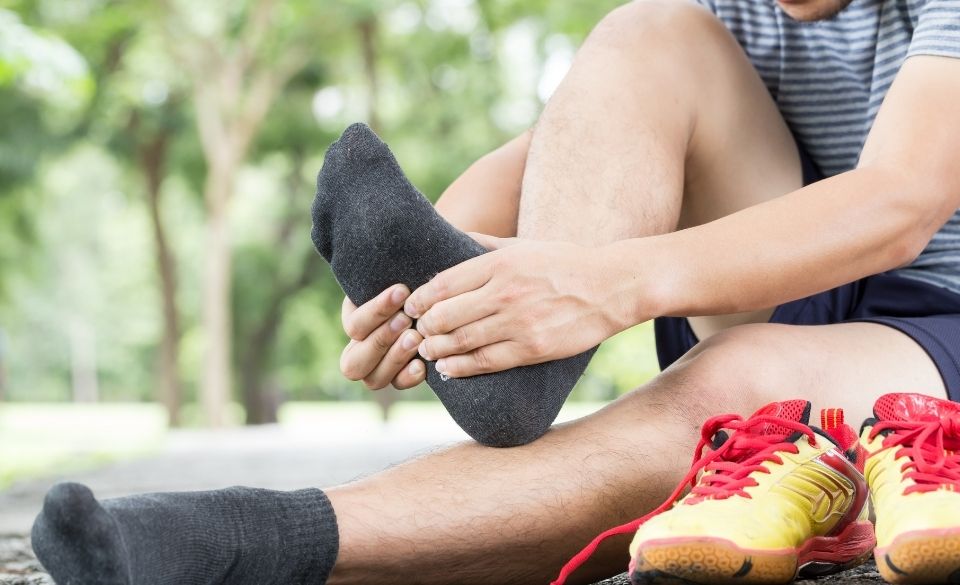
Foot Numbness When Running – A Guide to Numb Feet & Toes
Page Contents
Many of us experience numb feet and toes during our life. It can be caused by long flights on a plane, or just sitting around home. However, it’s a totally different feeling when you are out running.
In fact, it’s not unusual to experience foot numbness when running. But what causes this and what can you do about it?
The issue can happen for a variety of issues, that’s why in this article we discuss the causes of numb toes and feet during a run. So, keep reading to find out why.
Causes of Foot or Toe Numbness
Unfortunately for most people finding the cause of numb feet can take some time. This is usually done through elimination through the probable causes. Below we look at the most common causes of numb feet and toes when running.
Wrong Footwear
One of the most common causes of numb feet and toes is ill-fitting shoes. Shoes that are too tight or too narrow can cause numbness. Hence, it is important when buying running shoes that you get properly fitted by a trained professional. They will check the length and width of your foot and then look at your gait. Before looking at what model of shoe you should be running in.
The model of shoe you buy is important as numbness can also be caused by a biomechanical issue. So, the fitter will make sure the model of shoe suits your running style.
Once you have found the right shoes, make sure you leave an adequate room between the toes and the end of the shoe. This will allow the foot to swell during running, without making the shoes a tighter fit. Which may end up causing numbness.
Laces That Are Too Tight
A simple but common mistake. Many runners tend to over-tighten their laces. This is largely due to wearing shoes that are too big, or fear that the shoe isn’t secured enough.
If you do over tighten your laces you will find that the tightness may entrap the nerves on the top of the foot. Resulting in numbness.
Instead, try loosening your laces or lacing your running shoes with a different method. The best lacing technique is the one that keeps your foot securely in the shoe, without placing stress on the upper part of your foot. Alternatively, if you still find the laces tight around your ankles, try adding some padding under the tongue.
Poor Running Form
While not that common, poor running form can cause pressure on nerves in the foot. For example, heel strikers are more likely to get numbness in the feet and toes than midfoot runners. This is because they spend much more time in contact with the ground.
If this is the case, try shortening your stride. Then try to spend more time landing on the midfoot region. This way your feet are more likely able to land underneath your body, instead of in front. Thus reducing contact time with the ground and preventing other injuries like shin splints.
If you are unsure about your technique, speak to a physiotherapist or running coach. They can analyze your stride and find any issues you may have with your gait.
Foot anatomy
Your feet, especially your foot arches can play a role in numbness while running. If you don’t have very flexible or have flat feet, you are more likely to experience nerve compression.
However, this can usually be solved with custom-made orthotics. Most running stores of physios can take a scan of your foot and help align it and prevent the arch from collapsing too much.
Overtraining Can Cause Foot Numbness
If you are starting a running plan for the first time, or increasing your mileage or intensity, muscle trauma can develop. While this is not always a bad thing, doing too much too quickly or increasing your training can lead to swelling of the tissue in your feet. This can then lead to pressure on the nerves in the feet and toes.
Knowing this, it is important to gradually increase the load on your body. You can do this by keeping under the 10% rule or slowly increasing the intensity over a matter of weeks or months.
If you are new to running, try using the walk-run method, to begin with. Doing so will allow the muscles, tendons, and tissue in the feet to recover properly.
Muscle Tightness
Just like overtraining, tight muscles can often cause us grief in the long run. This can often result in anatomical conditions that put pressure on nerves in the feet.
Inflexible muscles can not only be caused by overtraining and lack of stretching, but also from sitting at an office desk all day.
So, it is important to stretch regularly both before and after running. That way you can keep your muscles relaxed, supple, and have good mobility.
How Do I Stop My Feet From Going Numb When I Run?
Luckily there are many ways to stop your feet from going numb when running. These include:
– Regular stretching
– Use of a golf ball under the arch
– Wearing correct shoes that fit properly
– Adjustment in running style
– Follow a warm-up routine
While the most common ways are stretching and wearing the correct shoes, following a warm-up routine before running can also help.
If you regularly experience numb toes or feet, try warming up a few minutes before running. This could include slow jogging, strideouts, or even foam rolling. That way your foot muscles will be loose and relaxed, ready for your workout.
Alternatively, if you struggle with muscle tightness, you can include some dynamic stretching into your warm-up routine.

Numb Feet When Running & Tight Calves
One thing that is common within runners that get numb feet, is tight calves too. Since the muscle is widely used during running, it is one of the most common muscle groups to get overworked and feel tight. This can result in nerve pressure and inflexibility of the foot. Resulting in numb feet during a run.
Either way, if you struggle with this constantly, check your running shoes, analyze your running and then perform regular stretching. This should be enough to help reduce the chances of numbness coming on.



